Parental opposition to childhood vaccination grows as Canadians worry about harms of anti-vax movement –
Opposition to mandatory childhood vaccination jumps from 24 to 38 per cent since 2019
February 28, 2024 – As some diseases such as measles and polio – thought to be worries of the past – have been breaking out globally and in Canada, many Canadians are expressing concern, even alarm, about waning vaccination acceptance in their country.
New data from the non-profit Angus Reid Institute finds seven-in-10 Canadians (71%) feeling the anti-vaccination movement is going to lead to unnecessary illness and suffering in the population.
This comes as there appears to be growing skepticism about vaccine efficacy among Canadians in the wake of the COVID-19 pandemic – especially among parents with children under 18.
One-in-six parents of minors (17%) say they are “really against” vaccinating their kids, a four-fold increase from 2019. There has also been a simultaneous 15-point decrease (70% in 2019, 55% in 2024) in the proportion of Canadians who support mandatory childhood vaccination in schools – a policy in place in Ontario and New Brunswick. Opposition to this idea has risen correspondingly from one-quarter (24%) to closer to two-in-five (38%).
Half of those with children younger than 18 say that it should be the parents’ decision whether to vaccinate (52%). That proportion drops to 32 per cent for those who do not have children under 18.
What is notable within this debate is that there has been little change in the proportion of those who say opposing child vaccination is irresponsible. In 2015, 2019, and 2024, between 72 and 75 per cent of Canadians have held this view.
In 2024, views of vaccinations vary across the country, from those who are completely confident in their efficacy, to those who feel they should not be given at all.
The Angus Reid Institute used responses from this survey to better understand this phenomenon, creating the Vaccine Acceptance Index. On one end are Max Vaxxers (29% of Canadians), those who feel vaccines are “very effective” at ensuring better outcomes for both the individual and the community, who support mandatory vaccination for children, and who are not concerned about the potential for “significant” side effects. On the other end are a group half that size – the Anti-Vax (14%) – who overwhelmingly feel that vaccination is harmful and unnecessary, that the science isn’t settled, and that the body does not need vaccination to build up immunity to these illnesses. In between are those who are largely supportive but have some reservation (the Vax Proponents 34%) and those who are skeptical but not dismissive (the Vax Skeptics 24%).
One thing that unifies Canadians across this spectrum is a sense that these are now more difficult issues to talk about with friends and family. At least one-in-five across each of the four vaccine acceptance groups say these are issues they worry about bringing up in social circles. This does, however, rise to three-in-10 among Anti-Vax and Vax-Skeptics.
More Key Findings:
- More than half of men between the ages of 35 and 54 (56%) are either Anti-Vax or Vax Skeptics, the highest number among all age and gender combinations. Comparatively, one-in-five women over 54 (22%) express these views.
- One-third of men under 55 are unsure or against vaccinating a child.
- Ontario residents are most supportive of a vaccine mandate for children in schools (61%), while Albertans (48%) and Quebecers (45%) are least receptive.
- Three-in-10 Canadians (29%) express skepticism about the science of vaccines. While one-in-three (34%) say they worry about the risk of significant side effects.
About ARI
The Angus Reid Institute (ARI) was founded in October 2014 by pollster and sociologist, Dr. Angus Reid. ARI is a national, not-for-profit, non-partisan public opinion research foundation established to advance education by commissioning, conducting and disseminating to the public accessible and impartial statistical data, research and policy analysis on economics, political science, philanthropy, public administration, domestic and international affairs and other socio-economic issues of importance to Canada and its world.
INDEX
Part One: Childhood vaccinations and school vaccine mandates
-
Half of parents say it should be “their choice”
-
One-in-six parents “really against” vaccination
-
Vast majority say opposing childhood vaccinations is irresponsible
Part Two: Vaccine viewpoints
-
The Vaccine Acceptance Index
-
Parents and vaccine acceptance
-
Political perspectives
-
Older Canadians most stalwart vaccine supporters
-
One-in-five say vaccines “not needed to build immunity”
-
Approximately three-in-10 question science
Part Three: Vaccines and social health
-
Seven-in-10 say people are going to get sick unnecessarily due to ‘anti-vax’ movement
-
One-quarter say they’re afraid to bring up vaccines with friends and family
Part One: Childhood vaccinations and school vaccine mandates
The COVID-19 pandemic led to a global discussion about vaccination for people of all ages. In the wake of that unparalleled event, the debate over childhood vaccination appears to have taken on a new intensity.
Some childhood vaccination rates dropped during the COVID-19 pandemic, leading public health officials to worry about achieving herd immunity, the proportion of the population that needs to be immunized to prevent spread of a given illness. And while provinces look to make up ground on vaccinations, it appears Canadians are moving in the opposite direction when it comes to their comfort level with mandating vaccines to attend school.
Since 2019, a 15-point drop is observed in the number of Canadians saying vaccinations should be mandatory to attend school or daycare with other children:

In Ontario and New Brunswick, children must be immunized against nine illnesses in order to attend school, unless the child receives an exemption. Ontario leads the country in support for mandatory childhood vaccination at 61 per cent, with Quebec and Alberta providing the most opposition:
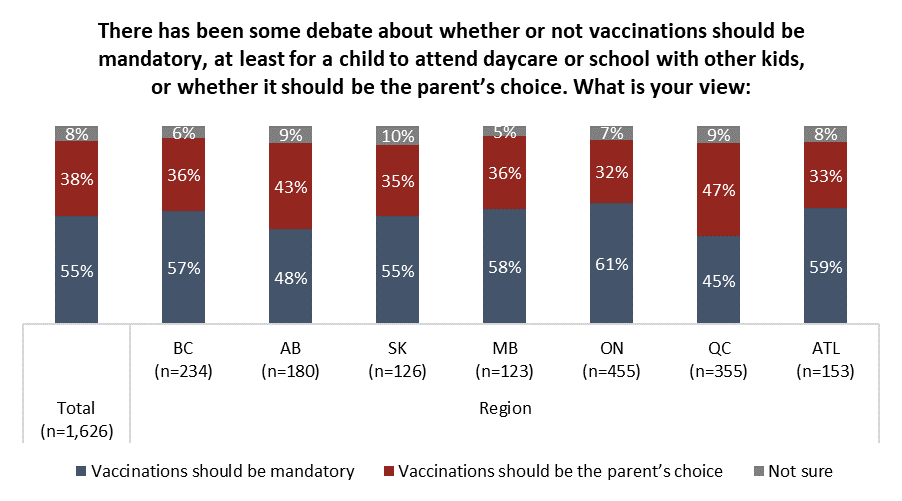
Half of parents say it should be “their choice”
What is perhaps most notable here are the views of parents. At least half of those with children younger than 18 say that it should be their choice whether to have their child immunized. This, compared to three-in-five Canadians without children (59%) who say that this should be mandatory to protect the population:

The feeling that vaccinations should be mandatory to attend school is relatively common among past Liberal and New Democrat voters. Close to three-quarters within both groups say that this should be established, while approximately one-in-five reject the idea. Rejection jumps to half among past Conservative voters (see detailed tables).
One-in-six parents “really against” vaccination
While the question of immunization mandates results in pushback from a significant segment of parents, it is worth noting that most parents still say they would vaccinate their child without reservation. Two-thirds of those with children younger than 18 say this, though a significant and herd-immunity-preventing proportion are either against immunization or unsure about it.
These numbers align with those reported by Statistics Canada. Vaccination rates for children under two for common childhood diseases range from above 90 per cent for measles and polio, to 77 per cent for diphtheria, pertussis and tetanus. Vaccination rates for older children vary depending on the disease but do not fall below 70 per cent.
However, the number of parents who say they are “really against” vaccinating their children has jumped four-fold. In 2019, just four per cent said this. Now one-in-six (17%) voice strong opposition to inoculating their kids:

Views about compelling immunization are key here. Among those who say it should be a parental choice, only half (49%) say they would vaccinate their child without reservation. Fully one-in-five (20%) are outright opposed to it, while three-in-10 (31%) are on the fence.

Vast majority say opposing childhood vaccinations is irresponsible
While the movement to maintain the parents’ right to choose on childhood vaccination has evidently increased, there has been a consistent view that choosing not to vaccinate would nonetheless be irresponsible. Across the past decade between 72 and 75 per cent of Canadians have held the view that those against childhood vaccination are in the wrong:
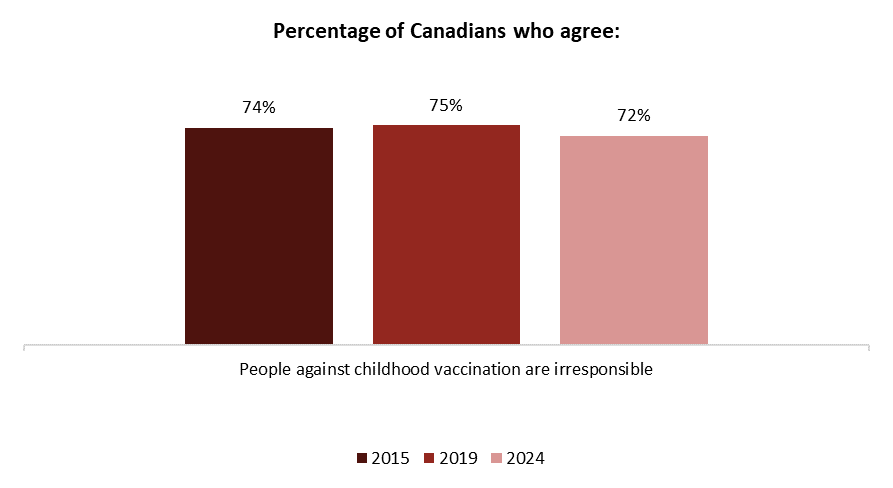
Part Two: Vaccine viewpoints
The Vaccine Acceptance Index
To further explore Canadian opinion with respect to vaccines, the Angus Reid Institute created the Vaccine Acceptance Index, which scores responses from Canadians on several key questions, including their beliefs on the efficacy of vaccines, whether or not they have been personally vaccinated against COVID-19 or influenza, whether they believe vaccines have harmful side effects and their beliefs on vaccinating their children. (see the scoring of the index here).
This Index sorts Canadians in four groups: the Max Vaxxers, those who have unwaveringly strong belief in the efficacy of vaccines; Vax Proponents, those who have minimal levels of doubt and are supporters of vaccinations; Vax Skeptics, those who believe in some vaccinations, but are skeptical of their efficacy and are more hesitant to vaccinate their children; and the Anti-Vax, those who resist vaccination entirely and believe there are more harmful side effects than possible benefits.
Canadians are more likely to be Vax Proponents (34%) or Max Vaxxers (29%) than Vax Skeptics (24%), or the Anti-Vax (14%)
Men are more likely to be Anti-Vax than women (16% vs. 11%). Canadians aged 35- to 54-years-old among both men and women express more skepticism and hesitancy about vaccines than other age groups. Meanwhile, Canadians older than 54, some of whose lives bridge Canada’s most significant modern health emergencies – the COVID-19 pandemic and the polio epidemic of the 1950s – show the strongest support for vaccinations:

Parents and vaccine acceptance
Having children appears to carry a correlation with higher levels of anti-vaccination sentiment. Consider that for those with children either between the ages of 12 and 17 or younger than 12, close to half are either Anti-Vax or Vax Skeptics, a much higher number than those without children. This suggests challenges to vaccination in jurisdictions where no childhood mandate is in place:

Political perspectives
Vaccinations became a wedge issue during the 2021 Federal Election campaign in the heart of the pandemic, after Prime Minister Justin Trudeau announced it would be mandatory for federal public service workers to be vaccinated against COVID-19. Then Conservative leader Erin O’Toole, who was pro vaccine and encouraged people to get vaccinated, instead suggested unvaccinated federal workers should have to take rapid tests. Opposition to mandatory vaccination lit the spark of the Freedom Convoy movement, after Trudeau’s government made COVID-19 vaccines mandatory for truckers.
Past CPC voters are much more likely to be Anti-Vax (22%) than those who voted Liberal (4%) or NDP (2%) in 2021:
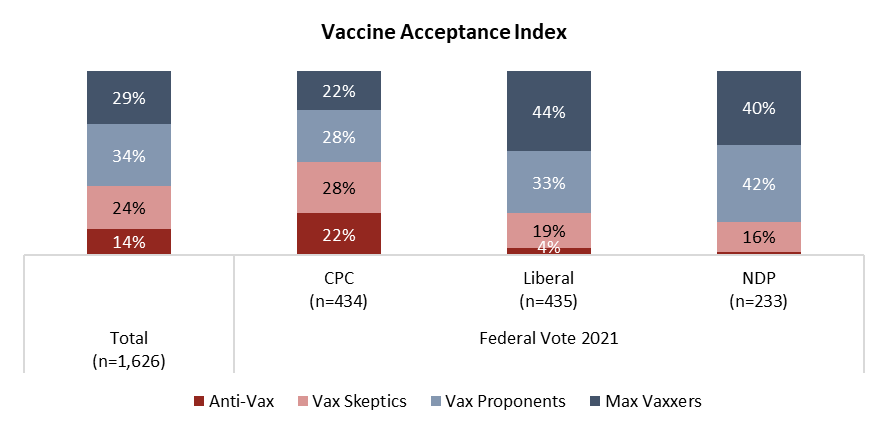
Older Canadians most stalwart vaccine supporters
The COVID-19 vaccination push appears to have engendered a newfound skepticism when it comes to vaccination overall. While older Canadians, those who were more supportive of the COVID-19 vaccine throughout the pandemic, given their heightened risk of serious illness, are consistent in their belief of the efficacy of vaccines in preventing illness in the wider population, there has been an increase in vaccine skepticism among all other groups, but especially men under 55:
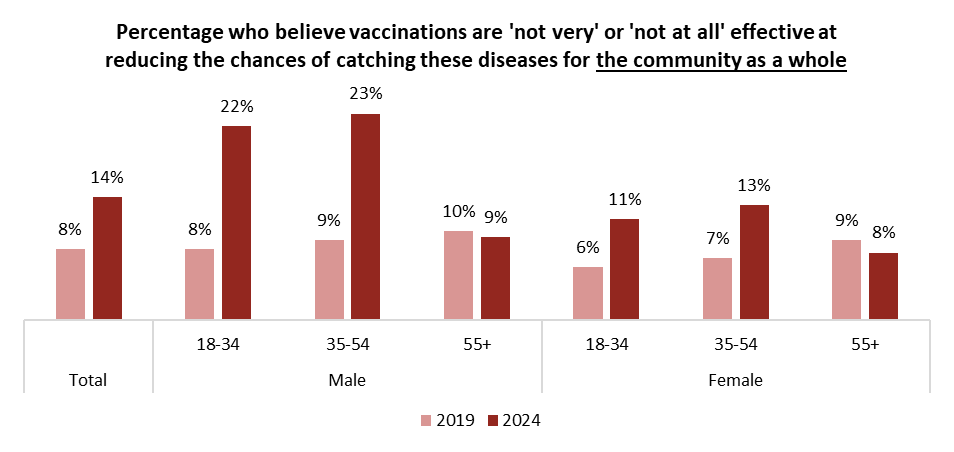
One-in-five say vaccines “not needed to build immunity”
Since ARI last polled on the subject of vaccinations, there has been a global pandemic which added another inoculation that is perhaps most prominent in people’s minds when they’re queried on the subject. To test the effect of concern over the COVID-19 vaccine, respondents were split into two groups for a series of statements about vaccines (see questionnaire here).
For all but one of the statements presented to respondents, there is no variation of statistical significance. The one exception was on the question of whether respondents believe “the human body doesn’t need vaccines to build immunity”. Canadians are more likely to believe that’s the case when the COVID-19 vaccination is part of the consideration (25%) than when they are explicitly asked to not consider the COVID-19 vaccination (19%, see detailed tables). Results for these questions are presented throughout this report are the aggregate of the two split samples.
There is a sense among some Canadians that vaccines aren’t necessary and that the human body can gain immunity to diseases on its own. One-in-five (22%) subscribe to this belief, including an overwhelming majority (69%) of the Anti-Vax. Most Canadians (73%) disagree, including majorities of all other groups along the Vaccine Acceptance Index:
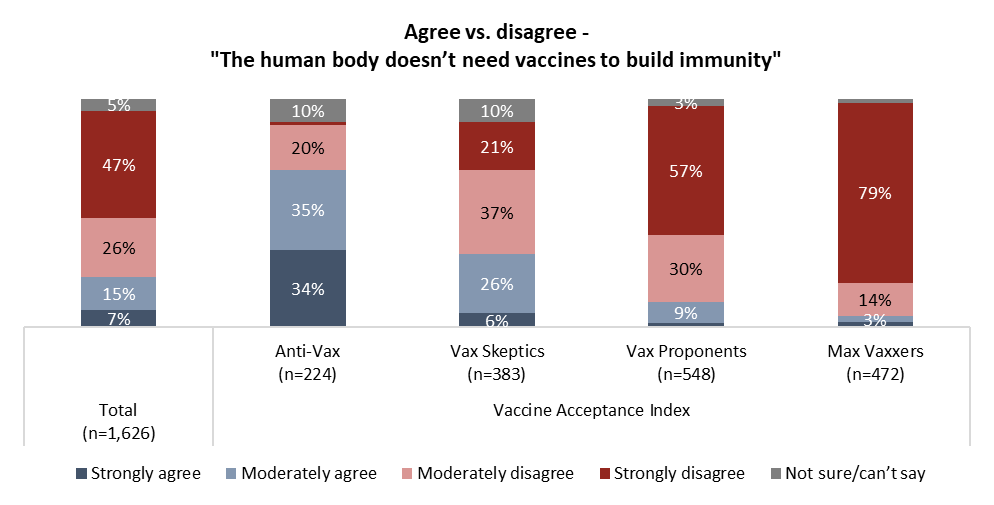
Here, too, parental views are imperative. With decision-making largely in their hands, aside from provinces with mandated childhood vaccination (Ontario, New Brunswick), three-in-10 parents say they do not feel the human body necessarily needs vaccines to build immunity:

Approximately three-in-10 question science
While Canadians are less likely to doubt the science of vaccines than they were in 2015, when ARI previously polled on the subject, they are more likely to believe there could be side effects than they were nine years ago. Three-in-ten (29%) believe the science on vaccinations isn’t settled, while one-third (34%) worry of the potential of serious side effects:
Doubt over the science of vaccines and the worry of side effects appear to be strong drivers of opinion for Canadians who are skeptical of vaccines and those who reject them entirely. A majority of Vax Skeptics (56%) and Anti-Vax (84%) worry of serious side effects from vaccinations, while three-quarters of the Anti-Vax (73%) and more than two-in-five (46%) Vax Skeptics say the science of vaccines is not settled:
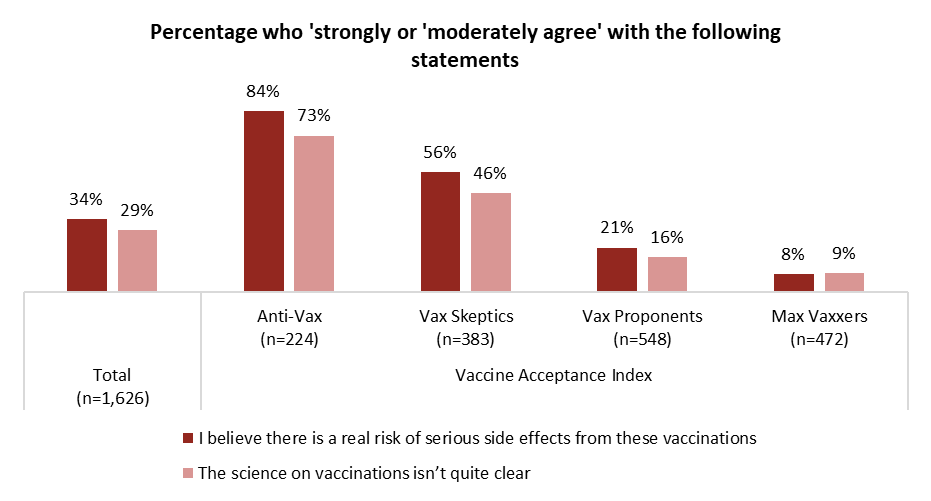
Past Conservative voters show more doubt of the science of vaccines and worry of the potential of serious side effects than other political groups. Approaching half (46%) of those who voted CPC in 2021 say “there is a real risk of serious side effects”, double the rate of Liberal (23%) and NDP (17%) voters who say the same. Two-in-five (39%) 2021 CPC voters believe the science on vaccination is ambiguous; a smaller proportion of past Liberal (22%) and NDP voters (9%, see detailed tables) agree.
Part Three: Vaccines and social health
Seven-in-10 say people are going to get sick unnecessarily due to ‘anti-vax’ movement
Public health officials are warning of the potential of measles outbreaks in Canada as rates of vaccination against that disease decline. Alberta has seen an outbreak of whooping cough in the province, a disease that’s preventable by vaccination. However, only 30 or 40 per cent of children are vaccinated against that disease in some places of the province.
A majority (71%) of Canadians see the anti-vaccine movement as causing unnecessary sickness. Majorities of all age groups hold this view, but men aged 35- to 54-years-old are most likely to disagree:

A majority of all major party voters in the 2021 federal election agree that this is a problem, though past Liberal and New Democrats are more intense in their assessments. Two-in-five (38%) past Conservative voters disagree that the anti-vax movement will have serious consequences for public health:

One-quarter say they’re afraid to bring up vaccines with friends and family
The issue of vaccination has also become a divisive topic. In 2021, during the COVID-19 pandemic, half of Canadians felt it was okay to ask others of their COVID-19 vaccination status, while half were either unsure (29%) or said it was off-limits personal information (22%). And this was during a time where most (86%) were willing to receive or had received at least one dose.
For one-quarter of Canadians and closer to three-in-10 parents of young children, vaccination is a fraught topic. Whether this is because of their own hesitations, or worries about conflict with those who disagree with their position, evidently a significant number of parents steer clear of this topic:

It is those who are more skeptical of vaccines who are more likely to say they are afraid of broaching the subject with friends and family. But at least one-in-five of all groups on the Vaccine Acceptance Index say the topic is one they fear:
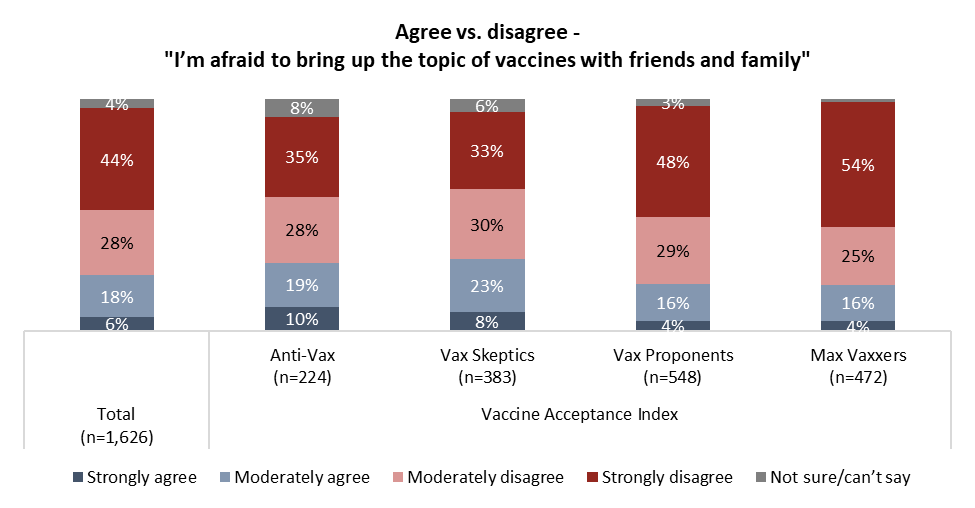
Survey Methodology:
The Angus Reid Institute conducted an online survey from Feb. 16-19, 2024 among a representative randomized sample of 1,626 Canadian adults who are members of Angus Reid Forum. For comparison purposes only, a probability sample of this size would carry a margin of error of +/- 2 percentage points, 19 times out of 20. Discrepancies in or between totals are due to rounding. The survey was self-commissioned and paid for by ARI.
For detailed results by age, gender, region, education, and other demographics, click here.
For detailed results by the Vaccine Acceptance Index, click here.
For detailed results by parents with kids and those without, click here.
For a PDF of the full report, including detailed tables and methodology, click here.
To read the questionnaire, click here.
MEDIA CONTACT:
Shachi Kurl, President: 604.908.1693 shachi.kurl@angusreid.org @shachikurl
Dave Korzinski, Research Director: 250.899.0821 dave.korzinski@angusreid.org @davekorzinski




